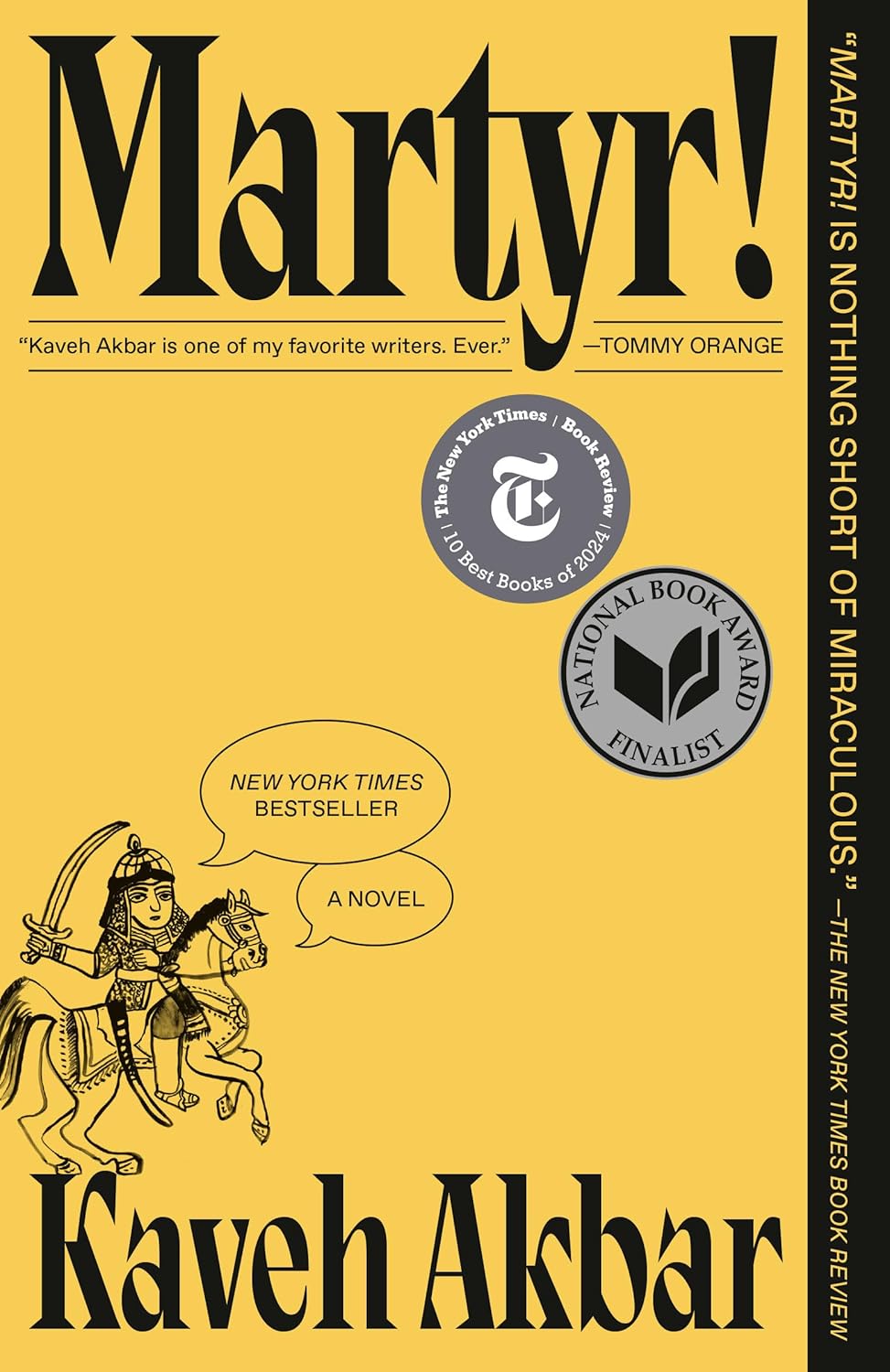
Martyr!
“Martyr!” is a thought-provoking poetry collection by Kaveh Akbar that explores themes of faith, spirituality, identity, and self-sacrifice. Through powerful, evocative language, Akbar delves into the internal conflict between religious devotion and the human experience, especially focusing on the concept of martyrdom—the tension between surrendering oneself for a cause and the self-affirmation of personal identity.
Akbar uses his poems to interrogate the nature of belief, the pain of self-doubt, and the constant balancing act between societal expectations and inner truth. His writing weaves the personal with the universal, blending intimate emotional struggles with broader existential questions.
The collection challenges readers to examine how faith and sacrifice intersect with everyday life, questioning both religious and personal identity in a modern context. Akbar’s work combines deep spirituality with a reflection on the human condition, resulting in poignant and contemplative poetry.
Description
- “Martyr!” by Kaveh Akbar follows Cyrus Shams, a first-generation Iranian American poet grappling with addiction, grief, and identity after his mother’s death in a U.S. government-related plane bombing. The novel traces Cyrus’s journey as he seeks meaning through art, faith, and encounters with figures like a terminally ill artist in the Brooklyn Museum. Themes of legacy, sacrifice, and the immigrant experience are explored through Cyrus’s introspective quest, blending personal tragedy with broader existential questions. Akbar’s debut novel is noted for its lyrical prose and examination of how individuals navigate pain and purpose.
FAQs
- What is the main theme of Martyr! by Kaveh Akbar?
- • The novel explores themes of identity, grief, legacy, and the search for meaning, particularly through the lens of Cyrus Shams, a first-generation Iranian American grappling with his mother’s tragic death and his own struggles with alcoholism.
- How does Kaveh Akbar’s background as a poet influence Martyr!?
- • Akbar’s poetic talent is evident in the book’s lyrical prose and striking imagery. The narrative is deeply introspective, blending artistic expression with emotional depth.
- Is Martyr! based on real-life events?
- • Yes, the novel incorporates real-life events, such as the destruction of Iran Air Flight 665 by the U.S.S. Vincennes in 1988, which serves as the backdrop for Roya’s death.
- What makes Martyr! unique compared to other literary fiction?
- • The book stands out for its blend of political rigor, surreal storytelling, and deeply personal exploration of immigrant experiences, grief, and artistic identity.
- How have readers and critics responded to Martyr!?
- • Reviews highlight the novel as “engaging and wildly entertaining” (NPR) and praise its depth, humor, and innovative narrative style. Some readers note the surreal ending as a point of discussion.
- Is Martyr! suitable for book clubs?
- • Yes, the novel includes rich themes and layered storytelling, making it ideal for discussion. Book club questions often focus on identity, trauma, and the role of art in healing.
- Who is the protagonist of Martyr!, and what drives their journey?
- • Cyrus Shams, a recovering alcoholic and poet, embarks on a quest to uncover family secrets and reconcile with his mother’s death, guided by voices of artists and historical figures.
- Does the book address Iranian American experiences?
- • Yes, Martyr! delves into the complexities of Iranian American identity, immigration, and cultural legacy through Cyrus’s personal and familial struggles.
- What is the significance of the exclamation mark in the title Martyr!?
- • The punctuation sets a provocative tone, hinting at the novel’s exploration of sacrifice, legacy, and the intensity of Cyrus’s emotional and existential journey.
- Is Martyr! Kaveh Akbar’s debut novel?
- • Yes, this is Akbar’s debut novel, though he is already an acclaimed poet, which informs the book’s lyrical and introspective style.
Quotes
- “I’m learning how much of myself I don’t actually need.” — Kaveh Akbar, Martyr!
- “Someone said alcohol reduces the ‘fatal intensity’ of living.” — Kaveh Akbar, Martyr!
- “This makes sadness seem more like tradition.” — Kaveh Akbar, Martyr!
- “That was the whole martyr book. He wanted to live perfectly enough to die.” — Kaveh Akbar, Martyr!
- “At the intersection of Iranian-ness and Midwestern-ness was pathological politeness, an immobilizing compulsivity to…” — Kaveh Akbar, Martyr!
- “The birds and blossoms dropped like fists of snow from the sky.” — Kaveh Akbar, Martyr!
- “A doom organ that just pulses all the time? Pulses dread, every day, obstinately? Like it thinks there’s a panther behind the curtain ready to…” — Kaveh Akbar, Martyr!
- “Eight of the ten commandments are about what thou shalt not.” — Kaveh Akbar, Martyr!
- “Love was a room that appeared when you stepped into it.” — Kaveh Akbar, Martyr!
- “Art was a way of storing our brains in each other.” — Kaveh Akbar, Martyr!
- Cyrus Shams 2,257 Words
- Chapter One 2,342 Words
- Chapter Two 2,257 Words
- Chapter Three 2,244 Words
- Chapter Four 2,265 Words
- Chapter Five 2,469 Words
- Chapter Six 2,323 Words
- Chapter Seven 13 Words
- Chapter Eight 2,277 Words
- Chapter Nine: Bobby Sands 2,246 Words
- Chapter Ten 2,592 Words
- Chapter Eleven: Hypatia of Alexandria 2,145 Words
- Chapter Twelve 2,493 Words
- Chapter Thirteen 2,311 Words
- Chapter Fourteen: Qu Yuan 2,199 Words
- Chapter Fifteen 2,277 Words
- Chapter Sixteen 2,342 Words
- Chapter Seventeen: Bhagat Singh 1,973 Words
- Chapter Eighteen: Roya Shams/Mom 2,302 Words
- Chapter Nineteen 2,127 Words
- Chapter Twenty 2,045 Words
- Chapter Twenty-one: Ali Shams 2,141 Words
- Chapter Twenty-two 2,282 Words
- Chapter Twenty-three 2,438 Words
- Chapter Twenty-four: Orkideh 2,380 Words
- Chapter Twenty-five 1,933 Words
- Chapter Twenty-six 2,276 Words
- Chapter Twenty-seven [When asked about…], Martyr! 1,977 Words
- Chapter Twenty-seven [Sitting on a…], Martyr! 2,151 Words
- Chapter Twenty-eight 2,008 Words
- Chapter Twenty-nine 1,936 Words
- Chapter Thirty 1,914 Words
- Chapter Thirty-one 2,451 Words
- Coda 2,218 Words
